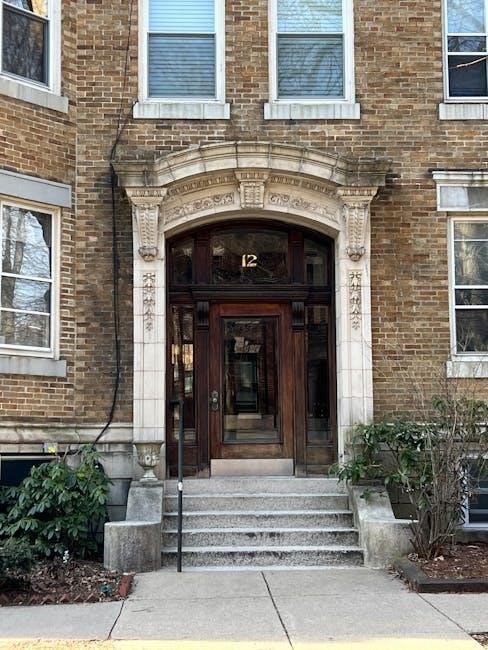Al-Anon is a support group for families and friends of alcoholics, offering emotional support and practical advice. Its purpose is to help members cope with the challenges of loving someone with a drinking problem, using the 12 Steps and 12 Traditions as tools for personal recovery and spiritual growth.

What is Al-Anon?

Al-Anon is a global fellowship of individuals affected by someone else’s alcoholism. It provides support and resources to help members cope with the challenges of loving an alcoholic. Founded in 1951, Al-Anon is based on the principles of the 12 Steps and 12 Traditions, adapted from Alcoholics Anonymous. Meetings offer a safe space for sharing experiences and finding ways to live positively. Al-Anon is not a professional service but a peer-based program focused on personal recovery. It emphasizes that members cannot control the alcoholic but can improve their own lives. Confidentiality is a cornerstone, ensuring anonymity for all participants. Al-Anon meetings are open to anyone affected by a loved one’s drinking, offering hope and guidance for emotional healing and personal growth.
The Role of the 12 Steps and 12 Traditions in Al-Anon
The 12 Steps and 12 Traditions are central to Al-Anon’s program, guiding members toward personal recovery. The Steps provide a spiritual framework for addressing the emotional and mental impacts of a loved one’s alcoholism, promoting self-reflection and growth. They encourage acceptance, humility, and reliance on a Higher Power. The Traditions ensure the unity and continuity of Al-Anon groups, fostering a supportive environment free from external influences. Together, they help members shift focus from the alcoholic to their own well-being, fostering independence and inner peace. These principles are essential for navigating the challenges of living with an alcoholic and building a fulfilling life beyond the influence of addiction.

The 12 Steps of Al-Anon
Al-Anon’s 12 Steps offer a structured path for personal recovery, enabling members to address the emotional impacts of a loved one’s alcoholism through spiritual growth, self-reflection, and building a fulfilling life.
Step 1: Admitting Powerlessness
Step 1 of Al-Anon asks members to admit their powerlessness over alcohol and recognize how it has made their lives unmanageable. This step is about acknowledging the emotional toll of loving an alcoholic and accepting that no amount of effort can control their drinking. It’s not about weakness but about confronting the reality that the situation is beyond personal control. By letting go of the illusion of control, members can begin to focus on their own healing and well-being. This foundational step encourages honesty and openness, setting the stage for further growth and recovery in the Al-Anon program.
Step 2: Believing in a Higher Power
Step 2 encourages members to come to believe in a Power greater than themselves, which can restore their lives. This step is not about religion but about embracing a spiritual concept that offers hope and relief; It helps members shift their focus from the alcoholic to their own recovery, recognizing that they are not alone. By trusting in this Higher Power, individuals find the strength to face challenges and transform their lives. This belief becomes the foundation for the rest of the steps, providing comfort and guidance as they navigate their journey toward healing and personal growth in Al-Anon.
Step 3: Turning Will and Life Over to God
Step 3 involves surrendering one’s will and life to a Higher Power, trusting in God’s care. This step is about letting go of control and allowing a spiritual force to guide decisions and actions. It emphasizes reliance on divine wisdom rather than self-will, fostering humility and acceptance. By turning lives over to God, members release the burden of trying to manage the alcoholic’s behavior and focus on their own healing. This step encourages spiritual surrender, allowing individuals to find peace and clarity in their lives. It is a profound act of faith, helping members align with a greater purpose and find freedom from obsession and fear.

The 12 Traditions of Al-Anon
The 12 Traditions guide Al-Anon groups, ensuring unity and anonymity. They promote harmony, protect the fellowship, and maintain focus on the primary purpose of supporting members.
Tradition 1: Unity
Tradition 1 emphasizes the importance of unity within Al-Anon groups. It states that individual members should never engage in debates or discussions that might lead to division or conflict. The primary purpose is to maintain harmony and focus on the shared goal of supporting those affected by alcoholism. By prioritizing unity, members ensure that meetings remain a safe and supportive environment for everyone. This tradition encourages members to set aside personal opinions and differences, fostering a sense of togetherness and collective strength. Unity is essential for the effectiveness of the Al-Anon program, as it allows the group to function cohesively and provide the best possible support for its members. This foundation of unity helps members grow personally and spiritually, enabling them to better cope with the challenges they face. Through unity, Al-Anon groups can thrive and continue to serve as a vital resource for those in need. The commitment to unity ensures that the fellowship remains strong and focused on its core mission of helping families and friends of alcoholics. By adhering to this tradition, members contribute to a positive and enduring support system. Unity is not just a principle but a practice that strengthens the entire Al-Anon community. It reminds everyone that the collective effort is more powerful than individual actions, ensuring that no one has to face their struggles alone. Tradition 1 serves as a reminder that the bonds of unity are what make Al-Anon successful in helping its members achieve personal recovery and emotional well-being. This tradition is a cornerstone of the Al-Anon program, guiding members to work together towards a common goal. By embracing unity, Al-Anon groups create an environment where everyone feels valued and supported. This, in turn, fosters a sense of belonging and purpose, which are crucial for long-term recovery and growth. Unity is not just about agreement; it’s about mutual respect and understanding. It allows members to learn from each other’s experiences and perspectives, enriching the overall support system. Tradition 1 is a testament to the power of collective effort and shared commitment, making Al-Anon a resilient and effective support network for everyone involved.
Tradition 2: The Spiritual Foundation
Tradition 2 highlights the spiritual foundation of Al-Anon, emphasizing the importance of a Higher Power as a collective guide for the group. Adapted from Alcoholics Anonymous, it states that God, as each individual understands Him, is the spiritual foundation of all Al-Anon groups. This tradition encourages members to rely on a power greater than themselves to find strength and guidance. It fosters an environment where spiritual principles, such as honesty, humility, and love, are central to personal recovery. By focusing on spirituality, Tradition 2 helps members detach from the alcoholic’s behavior and focus on their own growth. This spiritual foundation provides comfort, hope, and the courage to face challenges, uniting members in a shared purpose. It ensures that Al-Anon remains a place of healing and support, guided by timeless spiritual values. Through this tradition, members are reminded that their recovery is rooted in faith and trust in a Higher Power, which strengthens both individuals and the group as a whole.
Tradition 3: The Requirement for Membership
Tradition 3 states that the only requirement for membership in Al-Anon is that there be a problem of alcoholism in a relative or friend. This simple yet profound requirement ensures that the fellowship remains open to anyone affected by someone else’s drinking. By focusing solely on this condition, Al-Anon creates a welcoming and inclusive environment for individuals from all walks of life. It eliminates barriers such as personal beliefs, background, or circumstances, allowing everyone to find support and guidance. This tradition emphasizes that no one needs to meet specific criteria or pay dues to join, making the program accessible to all who need it. It fosters unity and equality among members, ensuring that no one is turned away from the healing and hope that Al-Anon offers.

The Importance of Spirituality in the 12 Steps and 12 Traditions
Spirituality is the foundation of the 12 Steps and 12 Traditions, guiding members toward personal recovery and fostering unity through universal principles like honesty, humility, and love.
Key Spiritual Principles: Honesty, Humility, and Love
Honesty, humility, and love are core spiritual principles in Al-Anon, essential for personal growth and healing. Honesty allows members to confront their reality, fostering self-awareness and authenticity. Humility teaches surrender and openness to guidance, while love promotes compassion and understanding. These principles, rooted in the 12 Steps and 12 Traditions, help members transform their lives, letting go of control and embracing a Higher Power. By practicing these values, Al-Anon members find inner peace and build stronger, healthier relationships, creating a supportive environment for everyone involved.

How to Implement the 12 Steps and 12 Traditions in Daily Life
Practice the 12 Steps daily through reflection, prayer, and action. Apply the Traditions in meetings and personal interactions to foster unity and mindfulness, enriching your recovery journey.
Practical Applications for Personal Recovery
Al-Anon members can apply the 12 Steps and Traditions by attending regular meetings, sharing experiences, and using tools like meeting schedules and phone numbers for support. Practicing principles such as honesty, humility, and love in daily interactions fosters personal growth. For example, Step 1 encourages admitting powerlessness, while Tradition 1 emphasizes unity in meetings. Members can also use slogans like “One Day at a Time” to stay focused. By integrating these practices, individuals can shift their attention from the alcoholic’s behavior to their own recovery, leading to emotional healing and improved relationships. These practical steps create a foundation for lasting change and spiritual well-being.

The Al-Anon program offers emotional support and practical tools, fostering personal growth and spiritual well-being through its 12 Steps and Traditions, helping members find peace and resilience.
Emotional Support and Personal Growth Through the 12 Steps and 12 Traditions
The 12 Steps and 12 Traditions of Al-Anon provide a foundation for emotional healing and personal growth. By working the Steps, members gain tools to manage their lives effectively, letting go of resentment and fear. The Traditions foster unity within the fellowship, ensuring a safe and supportive environment for sharing experiences. Through spiritual principles like honesty, humility, and love, members develop a deeper sense of purpose and inner peace. Al-Anon helps families and friends of alcoholics shift their focus from the alcoholic to their own well-being, encouraging self-care and resilience. This journey of recovery empowers individuals to lead fulfilling lives, regardless of the alcoholic’s choices.
